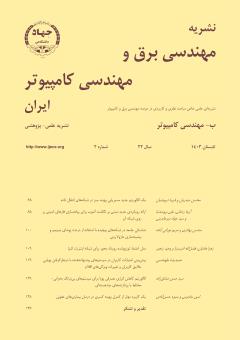الگوریتم کاهش انرژی مصرفی پویا برای سیستمهای بیدرنگ بحرانی-مختلط با پردازندههای چندهستهای
محورهای موضوعی : مهندسی برق و کامپیوتر
1 - گروه کامپیوتر و فناوری اطلاعات، دانشگاه پیام نور، ایران
کلید واژه: سیستمهای تعبیهشده بحرانی- مختلط, پردازندههای چندهستهای, انرژی مصرفی, تغییر پویای ولتاژ و فرکانس,
چکیده مقاله :
امروزه برخلاف سیستمهای تعبیهشده سنتی که دارای وظایف با درجه اهمیت یکسان هستند، بسیاری از سیستمهای تعبیهشده، بحرانی- مختلط میباشند و بیشتر مورد استفاده قرار میگیرند. سیستمهای بحرانی- مختلط، سیستمهای تعبیهشده بیدرنگی هستند که برای تجمیع برنامههای ایمنی- بحرانی و ایمنی- غیربحرانی بر روی یک بستر مشترک سختافزاری معرفی شدهاند. پردازندههای چندهستهای، قابلیت تجمیع کاربردهای متفاوت بر روی یک سختافزار را فراهم کرده و میتوانند انتخاب مناسبی برای سیستمهای تعبیهشده بحرانی- مختلط باشند. با این حال، کاهش انرژی مصرفی در این سیستمها بهدلیل حجم بالای پردازش و طراحی عموماً مبتنی بر باتری آنها یک نیاز ضروری است؛ بنابراین در این مقاله، یک روش زمانبندی ابتکاری بهمنظور کاهش انرژی مصرفی در سیستمهای بحرانی- مختلط متشکل از پردازنده چندهستهای معرفی میشود. این الگوریتم ضمن تضمین اجرای بهموقع وظایف بحرانی، انرژی مصرفی سیستم را با تغییر پویای ولتاژ و فرکانس (DVFS) کاهش خواهد داد. نتایج بهدستآمده از شبیهسازیها نشان ميدهند که انرژي مصرفي الگوریتم پیشنهادی در مقايسه با روشهاي مشابه تا 30% بهبود مييابد.
Today, unlike traditional embedded systems that have tasks with the same degree of importance, many critical embedded systems are mixed and are used more often. Mixed critical systems are real-time embedded systems introduced to consolidate critical safety and non-critical safety programs on a common hardware platform. Multi-core processors provide the ability to integrate different applications on one hardware and can be a suitable choice for mixed critical embedded systems. However, reducing the energy consumption in these systems is a necessary requirement due to the high volume of processing and their generally battery-based design. Therefore, in this paper, an innovative scheduling method is introduced to reduce energy consumption in mixed critical systems consisting of multi-core processors. This algorithm will reduce the energy consumption of the system by DVFS, while ensuring the timely execution of critical tasks. The results obtained from the simulations show that the energy consumption of the proposed algorithm is improved by 30% compared to similar methods.
